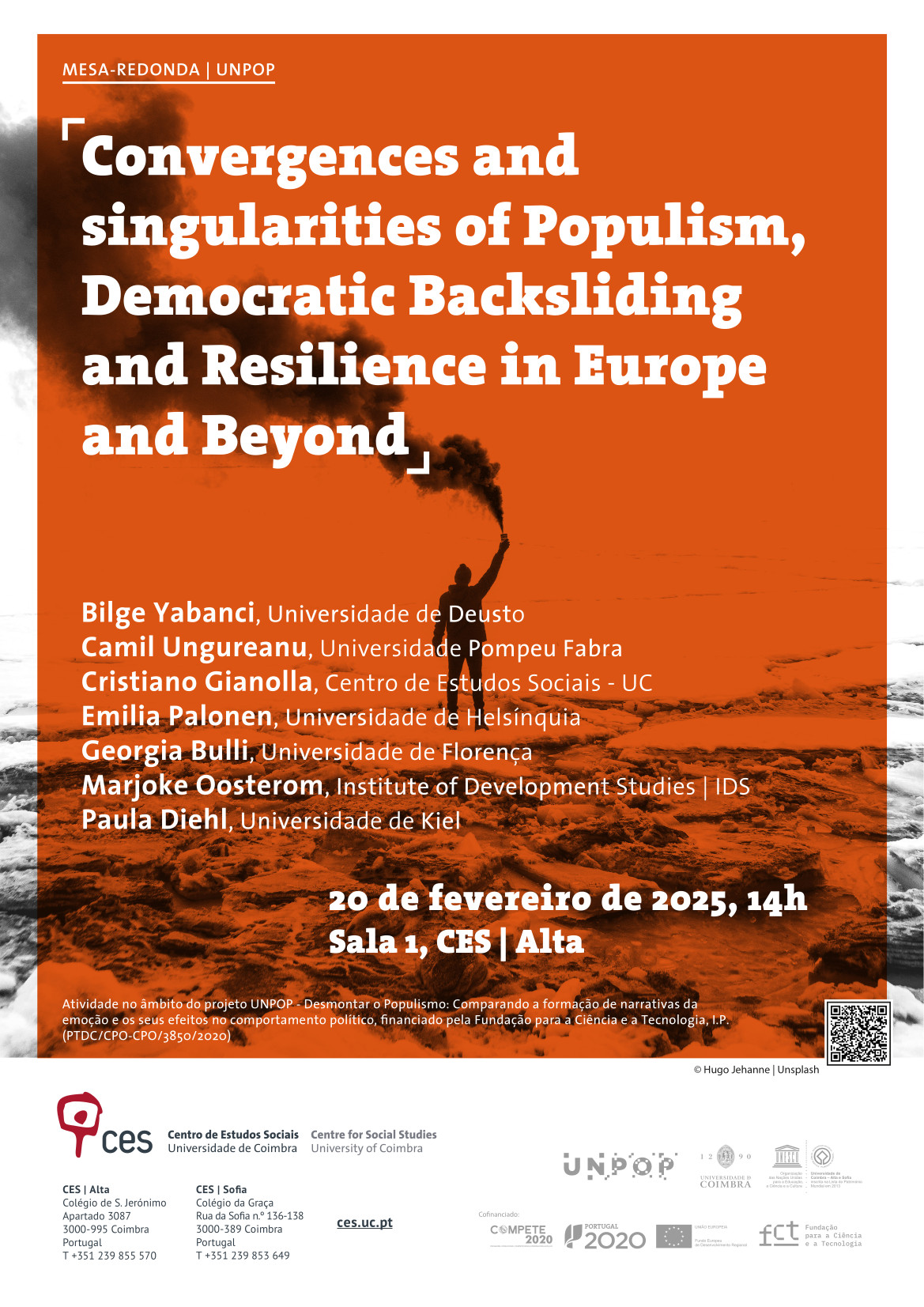ITM - Inter-Thematic group on Migrations
Round Table
Convergences and singularities of Populism, Democratic Backsliding and Resilience in Europe and Beyond
February 20, 2025, 14h00
Room 1, CES | Alta
Populism reflects global trends and poses threats to democratic resilience in Europe and beyond. However, while this phenomenon is associated with autocratic and illiberal tendencies, it is increasingly supported by citizens and is a necessary condition for democratic politics. In other words, populism needs to be studied in terms of its entanglement with both autocratic and democratic resilience potentials. Populist actors mobilize affect through the content of their discourse, fulfilling emotional needs among citizens whose support for democracy is undermined by perceived political, social, and economic deficits. By approaching populism as a political logic that operates through affective dynamics, it is possible to understand how it leads to democratic backsliding or resilience. The comparison of country cases allows to analyse how different political cultures operate on common or different dynamics, which power dynamics, discourses and narratives articulate in different contexts. Innovation, resistance, and backsliding emerge from constructed political logics that need to be compared and properly understood. With this aim in mind, the Round Table brings together scholars from different European countries. The debate will consider how democratic institutions can better respond to the populist upsurge and how the democratic imagination can be strengthened through civic engagement and political innovation.
Participants:
Bilge Yabanci, University of Deusto (Pais Basco), has expertise in studying the ways in which populist and autocratic actors use narratives to influence and polarize public discourse, and specifically the youth, in Portugal, Spain and Turkey.
Camil Ungureanu, Pompeu Fabra University (Barcelona, Spain), has experience working with the far right, cultural populism, the role of female leaders in populist phenomena and political mythologies mobilised to build political cultures in Spain and Romania.
Cristiano Gianolla, CES, University of Coimbra (Portugal). has experience of studying the entanglement of populism, collective emotions, political narratives and mythologies in Portugal and Italy.
Emilia Palonen, University of Helsinki (Finland), is expert on research on dynamics of inclusion and exclusion generated by political discourses with a focus on Finland, Hungary and the European Union.
Georgia Bulli, University of Florence (Italy) has expertise in the relationship between authoritarian regimes of the past and the autocratisation processes facilitated through the populist logic with a focus on Spain, Austria and Italy.
Marjoke Oosterom, Institute of Development Studies (Brighton, Uk), has expertise on civic-political action in contexts of populism and authoritarianism, and youth politics in the Global South including Zimbabwe, Uganda, Ethiopia, and Nigeria.
Paula Diehl, University of Kiel (Germany), has expertise in representative democracy and populism, and studies the scope of modern democracy by focusing on its normative predicaments. She focuses on Germany, Austria and Belgium.
This seminar is part of a series within the UNPOP project - UNpacking POPulism: Comparing the formation of emotion narratives and their effects on political behaviour, which aims to explore how narratives of emotion allow a deeper analysis of the way populist phenomena constitute and influence political behaviour.
Thus, the series of events developed throughout the project will address several issues involving the recent growth of populism, focusing on the role of emotions - both those considered negative such as anger and fear, and those considered positive such as hope and love - in political behaviour.
UNPOP is coordinated by Cristiano Gianolla and Lisete Mónico and is based at the Centre for Social Studies and by CINEICC - Center for Research in Neuropsychology and Cognitive and Behavioral Intervention of the University of Coimbra, and is funded by the Foundation for Science and Technology (PTDC/CPO-CPO/3850/2020).


